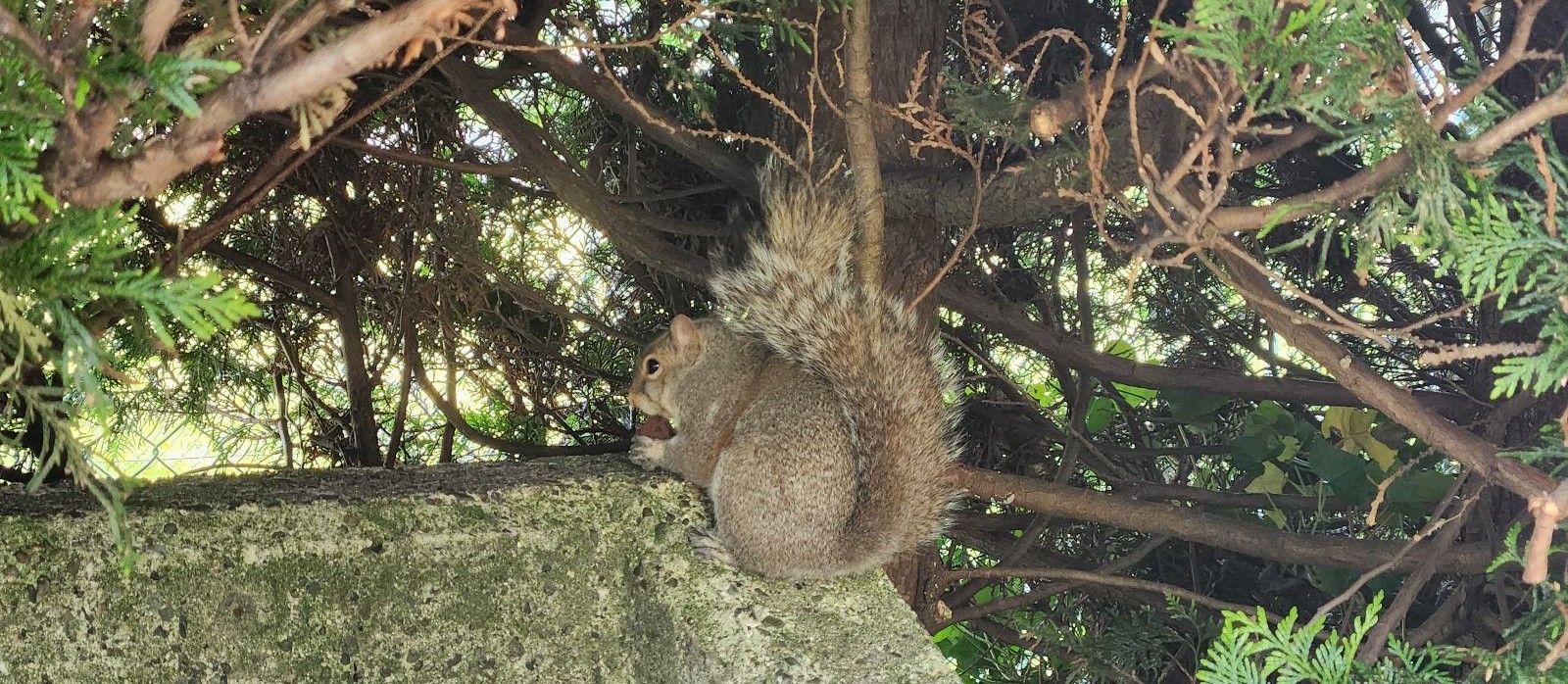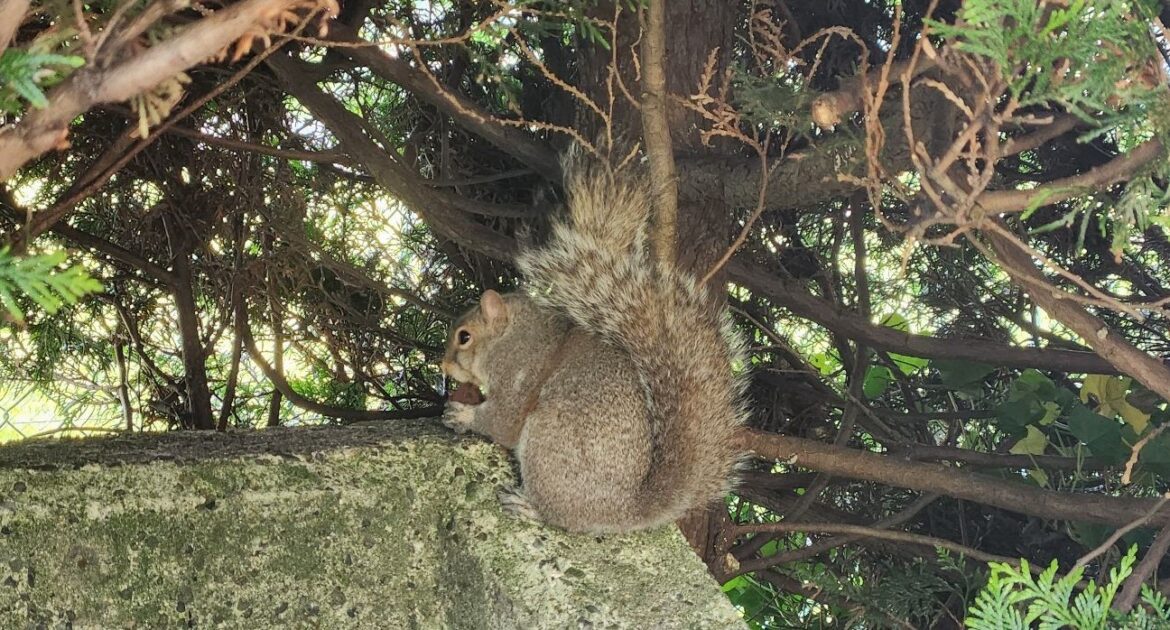Have you heard squirrels scurrying on your roof or seen them darting across power lines near your neighbourhood? If you live in Montreal, chances are, squirrels are a part of your everyday urban scenery. Their activity isn’t random; it’s a direct result of shifting seasonal squirrel behaviour. From their search for food to nesting habits, squirrels change their routines as the seasons roll by. This seasonal transformation becomes especially evident in urban areas, where squirrels adapt to city life by finding creative ways to survive and thrive.
Squirrels in urban areas rely on the environment around them, which often leads to interactions with humans. Each season brings unique squirrel activity, from nesting in spring to a frenzy of food-gathering in fall.
If these animals have made their way into your attic or have damaged your property, Skedaddle Humane Wildlife Control in Montreal offers effective, humane solutions. But first, understanding how seasonal changes influence squirrel behaviour can help you detect and prevent problems early.
Springtime: Nesting Season
Spring is a season of renewal, and for squirrels, it marks the start of their nesting cycle. Female squirrels give birth to their first litter of the year, usually between March and early April. During this time, their priority is building nests to ensure their babies are safe. These nests, also called dreys, can be found in trees and, all too often, in attics or wall cavities.
Urban areas provide a variety of nesting spots, and squirrels are quick to exploit them. Buildings, garages, and sheds offer protection from predators and unpredictable spring weather. This is why homeowners may hear scampering or scratching noises inside their homes during this period.
Here’s what to watch for in spring squirrel activity by season in your area:
- Increased noise in walls or ceilings from active nesting squirrels.
- Squirrels carrying nesting material like leaves, twigs, or insulation.
- A higher frequency of sightings near roofs or vent openings.
These springtime activities highlight why swift action is necessary. Left unchecked, squirrels can cause significant damage while trying to secure a nest.
Summer Behaviour: Exploring and Feeding
By summer, the baby squirrels born in spring have grown strong enough to venture outside their nests. This is a season of exploration and feeding. Young squirrels begin to establish their presence, while adult squirrels focus on gathering food to replenish their energy after the demanding spring months.
Squirrels in urban areas take full advantage of human activity during the summer. They’re resourceful creatures, scavenging food from outdoor trash bins, gardens, and bird feeders. You’ll likely see them leaping between rooftops or darting along power lines in their relentless search for food.
Urban homeowners should pay close attention to squirrel activity during the summer, as it often provides clues about potential nesting spots for the colder months. Look out for:
- Scattered food remnants near outdoor bins or gardens.
- Persistent visits to bird feeders, sometimes spilling or hoarding seeds.
- Chewed branches or small holes in lawns where squirrels may be burying food reserves.
While summer might seem relatively calm compared to other seasons, squirrels use this time to establish their footing for future nesting and food storage.
Peak Fall Activity
When fall arrives, squirrels take their already active behaviour to the next level. This is the most intense period of the year for squirrel activity by season as they prepare for the challenging winter ahead. Squirrels dedicate their days to gathering food, such as acorns, nuts, and seeds, which they bury in various locations as hidden food stores.
Fall is also the time when squirrels in urban areas are most likely to venture into homes. Warm, enclosed spaces provide the perfect environment for nesting during the colder months. They may chew through roofing materials, insulation, and ductwork to carve out a space for winter survival.
Keep an eye out for telltale signs of fall squirrel behaviour:
- Frequent sightings of squirrels darting back and forth carrying food.
- Dug-up gardens where squirrels have buried food.
- Chewed exterior structures, including roof edges or vents.
- Nest-building activity intensifies within walls or crawl spaces.
This frantic activity makes fall the best time to identify and address squirrel concerns before they create bigger issues by winter.
Fun Fact About Fall Squirrels: Did you know that squirrels are excellent planners but occasionally forget where they’ve buried up to 25% of their food? This uncollected stash often contributes to new tree growth within urban environments!
Winter Survival Mode
Winters in Montreal are no picnic for squirrels, but their preparation in the fall ensures they’re ready. By this season, squirrels minimize their outdoor activity and rely on their well-hidden food caches to survive. While they don’t hibernate, they do conserve energy by staying inside their nests for extended periods, venturing out only during warmer spells.
For homeowners, this means reduced squirrel interactions outdoors but potentially more activity inside homes. Squirrels often seek warmth, making attics, chimneys, and basements very attractive. During winter, you might also notice signs of these animals raiding unprotected food pantries or garbage bins if their stored supplies run low.
Winter is a quieter time for urban squirrel activity by season in terms of outward signs, but it’s a peak period for potential indoor disruptions.
How to Safeguard Your Home Year-Round
Squirrels are adaptable and clever, especially in urban areas where they find endless resources. While the seasonal patterns of squirrels are fascinating, their behaviour can lead to issues for homeowners. Prevention is always the best approach. Identifying and addressing potential entry points early can spare you from costly repairs.
Here are some practical tips to minimize squirrel problems:
- Trim any tree branches that come within 2 metres of your home to limit their access to the roof.
- Inspect your roof, vents, and exterior walls each season for signs of wear or potential entry points.
- Avoid leaving food sources in your yard by promptly cleaning up fallen fruit, nuts, or seeds.
- Install squirrel-proof covers on vents or chimneys to stop unintended house guests.
- Secure garbage bins with tight-fitting lids to prevent squirrels from scavenging your waste.
- Use mesh screens to cover open garden areas or raised flower beds that might attract digging.
- Keep firewood and outdoor storage items at least a metre away from your home to discourage climbing and nesting.
For more severe concerns, like squirrels already nesting inside your home, trust our experts at Skedaddle Humane Wildlife Control. We use effective and humane methods, such as one-way doors, which allow squirrels to leave your property without letting them return. This approach ensures both the safety of the squirrels and the protection of your home.
Seasonal Squirrel Behaviour? Skedaddle Can Help
Seasonal squirrel behaviour in urban areas is as fascinating as it is inconvenient. While they bring unique challenges each season, you don’t have to tackle these problems alone. Whether it’s scratching in your attic or squirrels nesting in your home, Skedaddle Humane Wildlife Control in Montreal is here to help.
Our team specializes in humane removal methods, like one-way doors, that effectively address your squirrel issues. Request an estimate today and take the first step towards keeping your home safe all year round. Don’t wait until seasonal squirrel behaviour causes more disruptions. Skedaddle has you covered!




